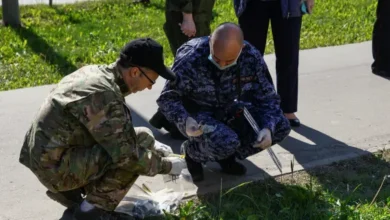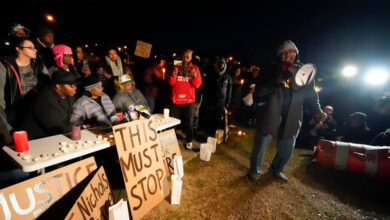How a child’s death caused an Ohio city to turn on its Haitian community

Sony Auguste remembers May 18 well. It was a warm, sunny day in Springfield, Ohio, and a crowd had gathered at the Veterans Park Amphitheater, where a line of canopy tents was decorated with red and blue balloons for Haitian Flag Day.
Live performers had been flown in from out of state to blast Caribbean tunes. The city’s burgeoning Haitian food scene — a mix of newly opened food trucks and unadorned cafes — served mountains of plantains, stew and rice.
On the other side of Buck Creek, at Springfield’s City Hall, the Haitian flag was raised and the country’s national anthem played.
For Auguste, a 35-year-old healthcare worker originally from the Haitian capital of Port-au-Prince, it was a moment of pride. He had moved to Springfield in June 2020.
“I could feel the connection with the other Haitians,” Auguste said. “I felt [at] home that day. To know that we have that, that was a big surprise.”
But in the months since, a pall has fallen over the city’s Haitian community. A child’s death has ignited tensions between new arrivals and longtime Springfield residents, leaving some Haitians wondering if they are welcome in the city at all.
A city in decline
Situated in an industrial stretch of the midwestern United States known as the Rust Belt, Springfield was once a leading manufacturing hub, home to major printing and machinery companies.
So when hundreds — then thousands — of Haitians started moving the Springfield, the city of 60,000 people got the population boost it was crying out for.
An estimated 4,000 to 7,000 Haitians have arrived in recent years, according to officials on the Springfield City Commission. Overall, the number of Haitian-born residents in the US has reached 730,780, according to the 2022 census.
Many escaped poverty and violence. Haiti is the poorest country in the Western Hemisphere, and the proliferation of gangs, particularly in the Port-au-Prince area, have forced thousands of people to flee. Some have used immigration pathways like the Temporary Protected Status (TPS) programme to travel to the US.
At first, Springfield welcomed the new arrivals. In 2014, the city launched a Welcome Springfield campaign designed to attract foreign-born residents and boost the local economy.
Haitians started to fill labour shortages at local farms and businesses like Dole Fresh Vegetables, one of the largest produce companies in the world. Caribbean cafes opened in shopping plazas where supermarkets had closed. And Haitian families started to pack events like the annual Clark County Fair, filling the air with the sounds of Haitian Creole.
But the demographic changes in Springfield prompted a backlash — one that reached a crescendo in late August.
A child’s death
It was 8:15am on a Tuesday morning when Hermanio Joseph, a 35-year-old Haitian national, drove a 2010 Honda Odyssey minivan into oncoming traffic.
A school bus was headed in the opposite direction, with dozens of children on board heading to their first day of class for the school year. One would never arrive.
Eleven-year-old Aiden Clark was thrown from the bus as it veered off the roadway and flipped. He died at the scene. Twenty-three other children were injured, including one seriously. Joseph was ultimately charged with two felonies: involuntary manslaughter and vehicular homicide.
Springfield erupted with grief at the news of the accident. Some residents channelled their outrage towards the Haitian community as a whole.
The anger came close to spilling over at a City Commission meeting on August 29, where Mayor Warren Copeland struggled to keep order. “Just be quiet, OK?” he snapped during one outburst.
For nearly two hours, residents came to the podium to speak. Some warned of an invasion of Haitians and the crime they allegedly would bring. Another person raged that the Haitian flag had been raised at City Hall as part of the Flag Day celebrations. Police officers stationed around the room shifted uneasily from foot to foot.
“I want to know: Who’s bussing them in? Who’s responsible for that, and who can stop them from coming?” one resident asked, echoing rumours that Haitian migrants had been arriving en masse on buses.
One woman who stood up to speak suggested that Springfield had become a “sanctuary city”, a term used to describe municipalities that do not cooperate with federal immigration enforcement. City officials reassured her it had not.
“There are people who are here that are not native Springfielders,” she continued, as another audience member shouted, “Illegals!” She replied, “Exactly.”
Some pleaded with the community to be tolerant. Rob Rue — a city commissioner who was recently elected to succeed Copeland as mayor — reminded the crowd, “Reckless driving is not just in the immigrant community.”
“There’s a lot of new people in our community,” Rue told the rumbling audience. “I get that. It’s a concern. Because there is cultures clashing.”
Even the parents of the 11-year-old child killed in the crash called for an end to the anger in a public statement in October.
“We do not want our son’s name to be associated with the hate that’s being spewed at these meetings,” Danielle and Nathan Clark wrote. “Aiden embraced different cultures and would insist you do the same.”
A community on edge
Still, Springfield’s Haitian community remains on edge, as neighbours continue to vent their opposition to immigration in the area.
The school bus crash was one of several roadway incidents involving Haitian arrivals in recent months. Days after the school bus overturned, another Haitian man crashed a car he was using to learn to drive into a Springfield church, making headlines around the region.
That incident likewise prompted an outcry. And local businesses have reported strain as they adjust to the influx of arrivals.










